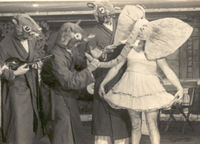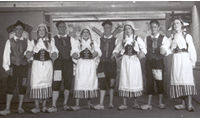Prisoners of War
Camp Entertainment
Images from Stalag VIIIa
Thirty musical numbers were used in the show, 'The Bumbles of Bumbleton' during which this photograph was taken
This image comes from the show, 'Whizz-Bang', a non-stop revue performed on 30 and 31 May 1944
Also from 'Whizz-Bang'. The Dutch costumes were made from palliasses, cloth wrappings from POWs parcels from home, sheets and/or groundsheets.
'We had a marvellous section of actors and they put on plays …we did shows by Wilde... always something with a comic touch. The guys, they knew how important humour was … we all liked to laugh, that was what kept us going I guess…. They'd put on a show for a week at a time, and they made all the stage props - marvellous stuff - just out of cardboard and packing cases and debris that was around the camp and they'd paint it up, it was lifelike, marvellous! And the shows were really good.' George Trundle
'Stage performances face many more obstacles in the primitive atmosphere of a prisoner of war camp, where costumes and properties must be improvised, female characters impersonated, and lighting, sound effects, scenery and all other requisites devised. That these obstacles were overcome was a major triumph.' Interlude: The story of British Prisoners of War in Stammlager VIIIA at Görlitz in Lower Silesia, Germany, London, 1945, p. 25
POW memories: Camp entertainment, George Trundle
![]() Hear George Trundle talking about how POWs kept themselves entertained. (mp3, 256kb)
Hear George Trundle talking about how POWs kept themselves entertained. (mp3, 256kb)
Transcript
Apart from chess, what other things did you do to keep yourselves entertained?
Well we actually had our own university in the camp. We used to teach languages, philosophy, logic, all kinds of things. There were a lot of talented people in there—artists from the French particularly, also we had a marvellous section of actors and they put on plays.…
We did shows by Wilde, 'The Importance of Being Earnest', always something with a comic touch. Guys, they knew how important humour was… They didn't need – they were all humorous anyway . We all liked to laugh—that was what kept us going, I guess. That and the sport, but this entertainment—they'd put on a show for a week you know, at a time. They made all the stage props, marvellous stuff, just out of cardboard and packing cases, and debris that was around the camp. They'd paint it up. It was lifelike. Marvellous. And the shows were really good..
Now, the quiz shows, would that be like inter-hut competitions?
Yes, exactly right. It was….
And the university that you had there was this something that was informal or..?
It was formal, had proper timetables and tutors and that… I taught Italian and French, as I say, with a vocabulary of about 200 words! But it went over and worked.
George Trundle interview, 08.02.02, side ?5
Programme for Stalag VIIIA, 1944/45:
The Dramatic Society at Görlitz also held regular play readings and a Shakespeare Reading Group functioned with readings supplemented by talks on the history of drama and on Shakespearean literature in general.
Next: Tiki Times >


